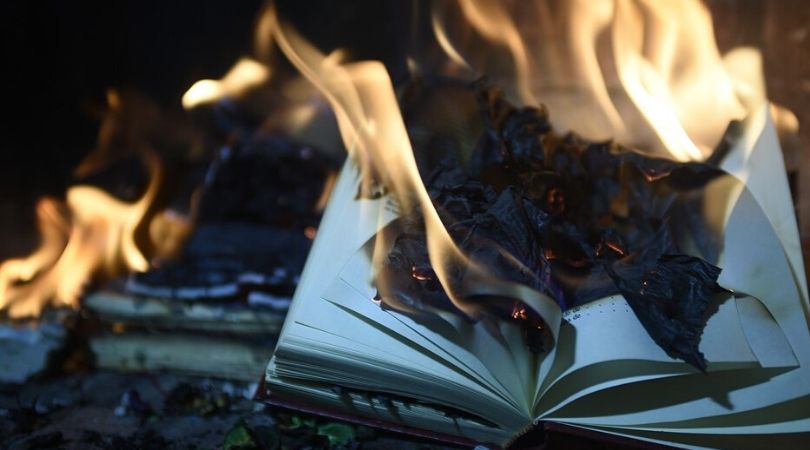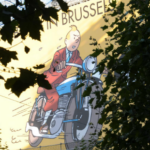Blog Post
Book-burnings and cancel culture come for Narnia, Tintin, and other children’s classics
By Jonathon Van Maren
When a bunch of harmless Dr. Seuss classics were pulled out of circulation for racism earlier this year, it became obvious that if progressives have their way, the selection of children’s literature considered acceptable will soon be thoroughly gutted. Woke educators are constantly surprised that writers of the past do not share the same values as writers of the present, insofar as there are no gay penguins or transgender crayons or gender-fluid children, although there is quite a bit of colonialism and a plethora of backwards views that existed, you know, at the time.
But that said, the sheer length of the list of children’s lit attracting the Eye of Sauron is staggering. Researchers, according to the Daily Mail, “are reviewing more than 10,000 books and magazines to expose offensive authors after campaigners demanded teachers censor racial slurs when reading Harper Lee’s To Kill A Mockingbird. You may have heard of the book—it’s a famous anti-racist classic that captured the American imagination just as the Civil Rights movement was getting underway. Lee isn’t good enough anymore, apparently, and the Mail reports that Cambridge University is planning to label classic children’s books with “trigger warnings.”
So which other books make the cut—or don’t? Laura Ingalls Wilder’s Little House on the Prairie is “potentially harmful.” Rudyard Kipling’s The Jungle Book was—and I’m not making this up—“slammed for its ‘colonial’ depiction of animals.” According to Salon magazine, Roald Dahl’s Matilda achieved the status of transphobic because Miss Trunchbull was masculine (don’t laugh, bigot.) I had failed to pick up the racism in Charlie and the Chocolate Factory, but apparently the Oompa-Loompas were bigoted to African pygmies (and I thought they were made up.)
But there’s racism everywhere, if you squint hard enough. The Secret Garden by Frances Hodgson Burnett has been “slammed” for “racist dialect and colonial overtones.” C.S. Lewis’s The Chronicles of Narnia have come under fire in publications like the Telegraph and The Atlantic because the Calormenes are obviously a racist stereotype of Muslims (obvious, at least, to those hunting for such things and finding them with astonishing and perceptive regularity.) Philip Pullman, a fantasy writer who hates Christianity, added that Narnia is also misogynist, racist, and prejudiced. These sins are apparently “blatant” to him.
Hilariously, the Mail notes that some “critics have claimed that Beauty and the Beast isn’t so much a romantic love story as it is a tale about a kidnapped young girl who develops Stockholm Syndrome.” If we’re going to start going after fairy tales, the Brothers Grimm will be axed entirely, and when censors discover the Russian fairy tales—my goodness. We’ll need therapy animals, counselors, and a roaring bonfire ready. Peter Pan can get chucked on when the fire’s good and hot, because critics say it is racist, as is Babar’s Travels—the cartoon elephant king meets “savage cannibals,” and these apparently do not exist and if they do, should not be stereotyped. Babar also includes colonialism, and this has already gotten bad Babar booted from one UK library.
In case you think that the suggestion of book-burning is hyperbolic, by the way, it has already happened in Canada. In 2019, about 5,000 children’s books—including novels, encyclopedias, and Tintin and Asterix comics, were “burned or removed from thirty schools in Quebec on the grounds that they showed prejudice against indigenous peoples.” Three copies of the comic Lucky Luke were burned just because the indigenous people weren’t the good guys—this, said the censors, was a problematic “imbalance of power.” The burning was actually approved by a school commission, which referred to the book-burnings as “an act of reconciliation.”
If you believe that there must be some limit to all this, don’t hold your breath. Earlier this year, the Toronto District Schoolboard actually cancelled a sit-down with Nobel Peace Prize recipient Nadia Murad, author of the mauling and magnificent book The Last Girl: My Story of Captivity, and My Fight Against the Islamic State. Murad is a survivor of sex slavery and of an ISIS-perpetrated genocide against her people, the Yazidis. This event was cancelled because—wait for it—the board superintendent said that Murad’s story might be offensive to Muslims and could “foster Islamophobia.” This is a person, it must be emphasized, who makes actual decisions about the education of real people.
The only proper response to this delusional nonsense is to ridicule it. I happen to own pretty much every book on the above list, and only someone truly dedicated to finding bigotry could find a book like, say, The Secret Garden racist. These iconoclasts want us to swap out the Little House books for LGBT children’s novels; The Jungle Book for abortion stories; Asterix comics for transgender tales. I understand that books of a different era sometimes reflect the values of that era, and that in some cases, we now see flaws in them more clearly. But take a look at what these censors condemn and what they promote. These people should be kept far, far away from the education of our children—and their views should be laughed off as the sick joke they are.









Not just a sick joke…but very very dangerous. The woke society can reap grave damage on our society which could linger for many years. This is fascism in a very polite way.
We can only conclude that those in favor of excluding such books have suffered terrible trauma in their lives for which they have never received therapy or healing.
So I tried to post a comment but when I submitted it I got a message that said it duplicate comment. It look like you’ve already said that!